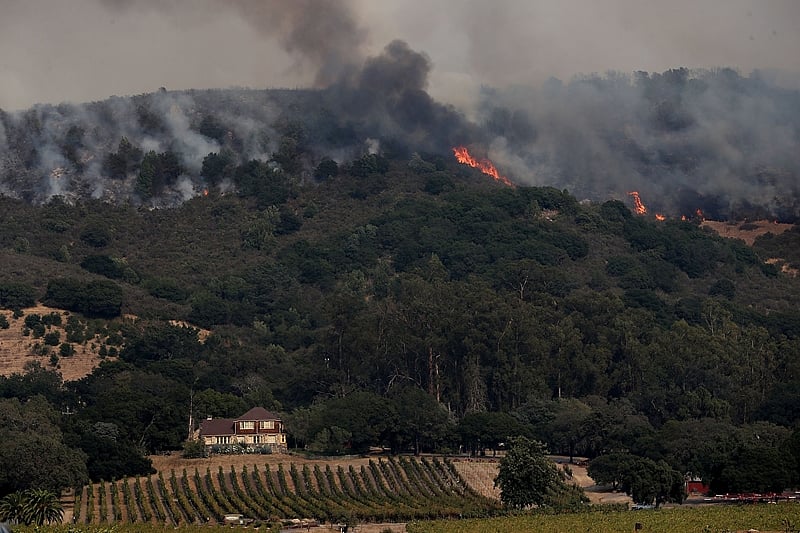The 'year of smoke' or the 'red sky year' is how 2019 is likely to be remembered. Fires raged across continents, destroying millions of hectares of rainforests, degrading agricultural land and sending dense clouds of smoke into the atmosphere. Agriculture, once a great leap forward for Homo sapiens, is rapidly becoming the bane of Planet Earth.
Natural fires, such as those that affected the arctic regions of Greenland, Siberia and Alaska this year, have been around as long as the forests. But the use of fire to modify habitats for agriculture is a human invention.
Stubble-burning and slash-and-burn agriculture have been traditionally practiced by communities – in north-east India and among Native Americans, for instance – for centuries. In pre-industrial economies, this kind of cultivation was sustainable. Today, the industrialisation of agriculture has magnified the scale and spread of these practices and made them unsustainable.
The result: a thick pall of smoke over North India, a massive 'haze event' in south-east Asia, daytime blackouts over South America. The Arctic fires, clearly visible from space, had barely died down when the Amazon went up in flames. The fires in Brazil were still burning in September, when the Indonesia sky blazed red. In October, it was India's turn.
The fires in the Amazon, Indonesia and India have one thing in common: they were initiated by farmers. In Brazil, which encloses 60 per cent of the Amazon rainforest, farmers were clearing land for soyabean cultivation. In Indonesia, the culprit was palm oil; a popular cooking medium and the ingredient in any number of processed foods and cosmetics. In India, rice stubble is burnt to make way for wheat, a lucrative cash crop thanks to the minimum support price (MSP). In short, we are paying an untenable price for the cultivation of cash crops.
Public and official responses to the wildfires and stubble-burning have been tepid at best. Brazilian president Jair Bolsanaro attributed the Amazon fires to “queimada”, or stubble-burning. Experts, however, said they were caused by farmers trying to clear forests for agriculture. In August, 80,000 fires raged across the rainforest, triggering worldwide alarm over the destruction of the planet's largest carbon sink.
Indonesia was gasping under a haze of smoke created by 2,000 wildfires on the island of Sumatra. In terms of scale, it was nowhere near as bad as the Amazon catastrophe, but enough to obscure the sky as far off as Singapore and constitute a health and environmental emergency. Clearing forests for oil palm plantations has been held responsible for massive deforestation – according to one estimate, 26 million hectares of primeval forest in the islands have been lost since 2001.
Indonesia supplies almost 60 per cent of the world's palm oil and has reacted negatively to global pressure to curb its use. In 2015, it threatened to walk out of the Paris Climate Summit and recently, it banned “palm oil-free” stickers on products, which alert consumers to the adverse health effects of palm oil, used in margarine, butter, chocolate, chips, toothpaste, shampoo and bio-fuels. Even as the European Union seeks to discourage palm oil, Europe-based corporations like Ferrero (producer of Nutella) enter into procurement contracts with palm oil plantations.
In India, Punjab emerged as the main culprit, as thousands of farmers set fire to their fields, to clear the kharif rice stubble and make way for the sowing of rabi wheat. Chief minister Capt Amarinder Singh's efforts to contain stubble-burning were token, even in the face of judicial strictures. He turned the argument around and demanded that the central government shell out Rs 1,700 crore to Punjab farmers, as an incentive to remove the stubble mechanically or manually, instead of burning it. For mechanical removal of stubble and seeding, the government is expected to provided balers, mulchers and happy seeders.
Subsidy and technology approaches cannot ensure a positive outcome. After all, they created the problem in the first place. Minimum Support Prices and government procurement encouraged the rice-wheat cropping pattern and the use of combine harvesters led to stubble-burning. These machines, which facilitate harvesting of grain stalks but leave inches of stubble behind, spread the practice across north and central india.
A radical change of mindset is the only sustainable way forward. Commodification of land has led farmers to think in terms of narrow self-interest, an outlook encouraged by the state. Economic and political interests dictate environmentally unsound policies. The result is that nations rich in natural resources act as exploiters instead of custodians of Planet Earth.
The writer is a senior journalist with 35 years of experience in working with major newspapers and magazines.
She is now an independent writer and author.







